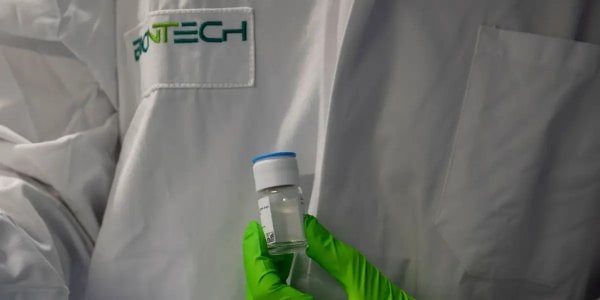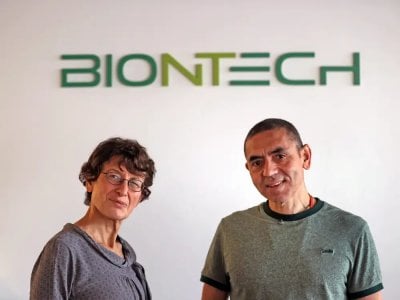Could this be the cure we’ve been waiting for? A cancer vaccine is expected to be rolled out by 2030
- Replies 20
There’s nothing more stomach-churning and nightmarish than finding out that you or your loved one has been diagnosed with cancer.
As grim as it sounds, most of us are usually forced to accept that it’s a ticking time bomb from there… It’s a terrible illness that has taken the lives of too many people, both young and old. But it looks like there may finally be a light at the end of the tunnel.
Cancer could soon be a thing of the past after medical experts have announced that a new vaccine is set to be rolled out by 2030.
‘We feel that a cure for cancer or to change cancer patients' lives is in our grasp,’ Professor Ozlem Tureci said in an interview over the weekend.
Her husband, Dr Ugur Sahin, who she co-founded the German pharmaceutical company BioNTech with, added that he believes cancer vaccines could be widely available ‘before 2030’.
They initially developed treatments for individualised cancer immunotherapy using mRNA technology. When the COVID-19 pandemic came into the picture, they adapted this technology to create one of the first and most effective vaccines to fight the virus: Pfizer.
Professors Ugur Sahin and Ozlem Tureci said the development and success of their COVID-19 vaccine have boosted their understanding of cancer as well.
‘We have learned how to better, faster manufacture vaccines. We have learned how the immune system reacts. This will definitely also accelerate our cancer vaccine.’
Professor Ozlem said that the developments also helped regulators deal with vaccines. When asked when the jabs could be available, Prof Sahin said they could be released ‘before 2030’.
‘The development of several COVID vaccines in record time showed the possibilities of mRNA vaccine technology, which could one day become an effective treatment to help beat cancer.’ Dr Sam Godfrey, Research Information Lead at Cancer Research UK, said.
‘Just as science was our route out of the pandemic, science is our route to beating cancer. We're optimistic that in the future, we will see mRNA technology and other exciting vaccine approaches, giving doctors more treatment options to help beat cancer.’ Godfrey added.
The slight catch is that the approach won’t come easy. For example, the BioNTech vaccine needs to be custom-designed for each person.
However, a preliminary study in pancreatic cancer suggested that the vaccine might help delay cancer from reoccurring. More research will be needed to perfect it.
‘Every step, every patient we treat in our cancer trials helps us to find out more about what we are against and how to address that.’ Tureci said, before adding a note of caution: ‘We are always hesitant to say that we will have a cure for cancer. We have a number of breakthroughs and we will continue to work on them.’
What are your thoughts about this potential medical breakthrough? Let us know in the comments below!
Learn more about how mRNA technology can become a weapon against cancer below:
Source: CRUX
As grim as it sounds, most of us are usually forced to accept that it’s a ticking time bomb from there… It’s a terrible illness that has taken the lives of too many people, both young and old. But it looks like there may finally be a light at the end of the tunnel.
Cancer could soon be a thing of the past after medical experts have announced that a new vaccine is set to be rolled out by 2030.
‘We feel that a cure for cancer or to change cancer patients' lives is in our grasp,’ Professor Ozlem Tureci said in an interview over the weekend.
Her husband, Dr Ugur Sahin, who she co-founded the German pharmaceutical company BioNTech with, added that he believes cancer vaccines could be widely available ‘before 2030’.
They initially developed treatments for individualised cancer immunotherapy using mRNA technology. When the COVID-19 pandemic came into the picture, they adapted this technology to create one of the first and most effective vaccines to fight the virus: Pfizer.
Professors Ugur Sahin and Ozlem Tureci said the development and success of their COVID-19 vaccine have boosted their understanding of cancer as well.
‘We have learned how to better, faster manufacture vaccines. We have learned how the immune system reacts. This will definitely also accelerate our cancer vaccine.’
Professor Ozlem said that the developments also helped regulators deal with vaccines. When asked when the jabs could be available, Prof Sahin said they could be released ‘before 2030’.
‘The development of several COVID vaccines in record time showed the possibilities of mRNA vaccine technology, which could one day become an effective treatment to help beat cancer.’ Dr Sam Godfrey, Research Information Lead at Cancer Research UK, said.
‘Just as science was our route out of the pandemic, science is our route to beating cancer. We're optimistic that in the future, we will see mRNA technology and other exciting vaccine approaches, giving doctors more treatment options to help beat cancer.’ Godfrey added.
The slight catch is that the approach won’t come easy. For example, the BioNTech vaccine needs to be custom-designed for each person.
However, a preliminary study in pancreatic cancer suggested that the vaccine might help delay cancer from reoccurring. More research will be needed to perfect it.
‘Every step, every patient we treat in our cancer trials helps us to find out more about what we are against and how to address that.’ Tureci said, before adding a note of caution: ‘We are always hesitant to say that we will have a cure for cancer. We have a number of breakthroughs and we will continue to work on them.’
What are your thoughts about this potential medical breakthrough? Let us know in the comments below!
Learn more about how mRNA technology can become a weapon against cancer below:
Source: CRUX









